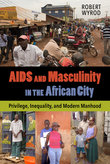AIDS and Masculinity in the African City: Privilege, Inequality, and Modern Manhood

AIDS and Masculinitiy in the African City draws on several periods of fieldwork in Bwaise, an informal settlement in Kampala, Uganda. Wyrod writes that in Bwaise, AIDS is a common presence, and has been reshaping gender relations over decades (albeit in limited ways). He examines three axes of masculinity – work, authority and sexuality – and the ways that their broader economic, social and cultural contexts affect experiences relating to the disease.
Central to this analysis is what Wyrod calls “masculine sexual privilege,” or the lopsided power that men continue to have when determining the number and nature of intimate relationships. This needs to be seen within a broader landscape of changing gender relations and tensions, which in Uganda include legislative responses to gender-based violence, women’s political representation, greater attention to women’s property rights, and politicized attitudes towards same-sex relations.
As for the economic context, growing inequality and reduction in men’s traditional dominance in work have contributed to a substitution of economic power for sexual power (even if the latter is far from new). As well, poverty remains the single most important risk factor for contracting HIV in African cities. Poverty not only limits access to much-needed health care, but also – according to Wyrod – shapes contexts of recreation and socializing in ways that challenge sexual health. Wyrod argues that residents of Bwaise find it difficult to establish “harmonious intimate relationships” when living in severe economic inequality, which is linked to transactional sex, concurrent sexual relationships to strengthen masculine status, and other social realities.
Given the complicated interplay of factors behind gendered experiences of HIV in African cities, Wyrod emphasizes that traditional donor-led public health approaches have fallen short. He argues (page 229),
“the simplistic focus on monogamy and being faithful has driven male infidelity underground and obscured how masculine sexual privilege persists…The key issue is the persistence of men’s privileges to dictate the terms of sex and the freedom to choose, on their own, to establish multiple sexual partnerships. These are the issues that require long-term attention and explicit engagement.”
In one example of a Western biomedical approach that has supplanted more locally rooted, socially integrated, and less expensive responses, Wyrod mentions zero grazing, or a Ugandan practice of keeping sexual relationships to a relatively restricted circle. Zero grazing has shown promise for reducing rates of HIV infection, yet the donor community has favoured measures like condom distribution, abstinence campaigns, and antiretroviral drugs. These measures fail to address the social inequalities and gendered power relations at the core of Wyrod’s argument. The last chapter attempts to lend credence to the book’s title by framing Wyrod’s research in Bwaise within other studies of AIDS and masculinity in cities of sub-Saharan Africa. This chapter describes how the masculine sexual privilege Wyrod describes can be seen in other contexts, from romantic patronage relationships in Malawi to conspicuous sexual consumption in southeastern Nigeria. Wyrod writes (page 220):
“The key themes from my fieldwork in Bwaise are prominent in eastern, western, and southern Africa: an ideology of male sexuality rooted in men’s privileges of controlling sex and having multiple sexual partners; the multifaceted impact of precarious work and economic inequality on male sexuality; the intertwining of anxieties about women’s rights and gender equality with masculine sexual privilege; and, most significantly, the limited effect the AIDS epidemic has had on remaking masculine sexual privilege.”
Further reading:
Bond, Lydia S (1992), “Street children and AIDS: Is postponement of sexual involvement a realistic alternative to the prevention of sexually transmitted diseases?”, Environment and Urbanization Vol 4, No 1, pages 150–157, available at http://journals.sagepub.com/doi/pdf/10.1177/095624789200400115.
Mabala, Richard (2006), “From HIV prevention to HIV protection: addressing the vulnerability of girls and young women in urban areas”, Environment and Urbanization Vol 18, No 2, pages 407–432, available at http://journals.sagepub.com/doi/pdf/10.1177/0956247806069624.
van Donk, Mirjam (2006), ““Positive” urban futures in sub-Saharan Africa: HIV/AIDS and the need for ABC (A Broader Conceptualization)”, Environment and Urbanization Vol 18, No 1, pages 155–175, available at http://journals.sagepub.com/doi/pdf/10.1177/0956247806063971.
Book note prepared by Christine Ro
Search the Book notes database
Our Book notes database contains details and summaries of all the publications included in Book notes since 1993 - with details on how to obtain/download.
Use the search form above, or visit the Book notes landing page for more options and latest content.
For a searchable database for papers in Environment and Urbanization, go to http://eau.sagepub.com/

